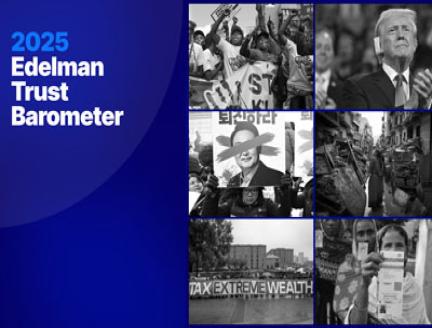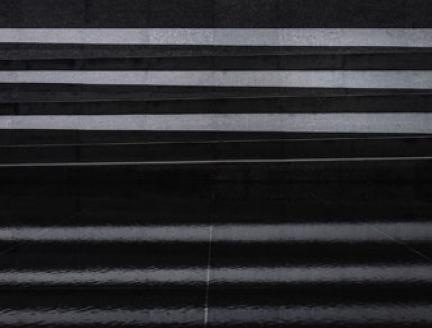Karena Crerar, Advisory Practice Lead at Edelman Africa interviewed Prof. Adam Habib - Vice Chancellor of University of Witwatersrand about the critical role leaders and institutions are playing during this humanitarian crisis. The discussion further delved into the perception of the ethical behaviour of the institutions, specifically looking at transparency and integrity as key elements for accountable leadership during a crisis.
Prof. Habib mentions some challenges and opportunities from online learning, touching on social justice and the awareness of social inequality. And he concludes with a note on the future of higher education and the need to practice global collaboration.
Question (Karena Crerar): Our Edelman Trust Barometer mid-year research showed us an unprecedented rise in trust in all four institutions, being government, business, media, and NGOs. Government is the most trusted institution globally for the first time in the 20 years we've been studying trust. Is this a result that surprises you?
Answer (Prof. Adam Habib): No, it doesn't. In historical moments of crisis, people look towards institutions and leaders to assist. Where institutions rise to the challenge in some form or another, people begin to trust them more.
In the South African context, the fact that President Cyril Ramaphosa stood up and said “Look we've got a crisis, I'm going to prioritise lives over the economy. I know this is a difficult moment here, and I'm going to make hard decisions,” and the fact that he brought academics to support him, I think all of that added to, and enhanced his stature as a leader, and enhanced trust factors in the Presidency.
I think similarly, where you saw billionaires putting down billion Rands towards the Solidarity Fund to support society, even though some individuals were cynical, in the end people acknowledged that it was put down in the context of where people needed it. I think in a sense that enhanced people's trust in business in a similar kind of way.
So, I'm not surprised to see that in moments of crisis, there is vulnerability, you are scared, but you do see somebody trying to assist you, even if they don't entirely succeed, and that is something that enhances your trust in them, at least you know they tried, and it seems to me that is what we are seeing in this historical moment.
I also think that there is a second thing, in all of these events. There are people who are harping, from the side-lines, and there are a number of South Africans complaining about the State, and how Cyril made decisions that prioritised health over the economy. It seems to me that the trick about life, and about understanding trust, is getting to what 95 percent of the people are thinking. Often the 95 percent are silenced, or they are marginalised by the loud voices of the 5 percent.
So, in the public discourse you hear the 5 percent who are in positions of leadership, and you struggle in a highly unequal society, just to hear the 95 percent. The great thing about the 5 percent is that they always try to claim to speak for the 95 percent, but they very rarely do. And if you can try to amplify the 95 percent and bring their voice out, then you have a very different outcome than when you listen to the 5 percent. I think that is going to change going forward, as the vulnerability of the nation builds.
Question (Karena Crerar): Is it possible for us to tell right from wrong in the midst of a crisis? For leaders to be able to identify the right decisions from the wrong ones?
Answer (Prof. Adam Habib): It is so tough to make decisions in that context, and it’s tough to make some of those calculations. Some of those calculations are legitimate, and others are not. In the midst of a challenging moment you don't always have all of the cards at your disposal, you don't have a full understanding of the consequences, and how they could unfold. What you have to do is make calculated judgements.
It seems to me that in wanting to maintain the trust levels, or if you are serious about being an accountable leader, then you are going to have to accept the trade-offs and make assumptions, and be accountable for those decisions. What you do is you make those choices, and you need to be transparent about why you made those choices.
I think this touches on integrity as well. People begin to interpret the integrity underlying your decision, and the judgement that is made, is not on the decision itself, but rather on the integrity behind the decision. And it seems to me in a difficult moment, that's all you can do. If you are thinking you are not going to make mistakes, then you are in serious trouble because you are going to make mistakes. What you have to do is be explicit about the thinking processes, and the assumptions, and the trade-offs you are making, given the information that you have available in that historical moment.
And it seems to me that is what people — the 95 percent — really read into your decision making, in periods of crisis and periods of calm. The politicians or those that are opposed to you will never, but the 95 percent will read the integrity, and while they might not always agree with you, they will say, "that person made the choice from a good place, from a good point".
It seems to me that in March, when Cyril Ramaphosa stood up, the vast majority of South Africans said, "I don't always agree with him, but he's making that decision from a good set of assumptions, he's doing it because he means well" and that's I think important.
Question (Karena Crerar): Despite all the pessimism at the moment, all the concerns and anxiety, we've seen that a lot of people still feel like this pandemic will lead to valuable innovations and changes for the better in the way we work, and live and treat each other. One of these innovations and changes is the move to online learning. What does the future look like in your view for academic institutions? What could the pivot potentially have meant for the future, and do you think this will fundamentally change how we think about learning?
Answer (Prof. Adam Habib): So, I do think it's going to fundamentally change, but I don't think it is going to do it exactly as we imagined it at this moment. We have known for some years now that the fundamental shifts in digitised technologies is bringing a revolution in higher education, so we've been experimenting for at least five years in a very, very serious way on digitised learnings. We’ve offered free Mass Online Courses, and we partnered with a local company to look at taking some of our full teaching programmes online, but we have had huge opposition, mainly from the academic side, who would argue that the pedagogy was not appropriate, that it is unequal.
When it came to the pandemic, and we got trapped in with the lockdown, we had to decide how to proceed - do we lose the academic year? When we raised the option of online learning, there was an opposition that emerged because suddenly people said to us that all of us are not equal, they didn’t have devices, or connectivity.
The public debate began, because immediately we were saying this is what we're thinking, and we had the political 5% saying, "no, you don't dare". Our Student Representative Council opposed it, and their argument was that if everybody can't do it, nobody should. I spent four to five weeks in a public discourse arguing that social justice does not mean going to the lowest common point, that's an illogical position.
What is required for social justice is an awareness of social inequality, and mitigating its consequences, and lending a helping hand as opposed to impoverishing everybody. I think we won that fight because we were trusted by the 95 percent and the 95 percent came out and said yeah that's a sensible thing to do, it's a sensible approach to take.
You have to look beyond the noise of the day and go to suss out the integrity of the broader community. I'm convinced that the vast majority of people in our society are decent human beings, they mean well, and if you appeal to that, they might not always agree with you, but they will reciprocate with trust.
I think we're moving towards a situation where online is here to stay, but I don't think we must ignore the challenge of online learning. The reason the Wits Executive could pull off online learning was because we only needed to provide computers and connectivity for 15 percent of our students.
Another challenge, learning at university doesn't just happen in the classroom, it happens outside the classroom. It happens through the sub-skills that you learn, and you never learn sub-skills in the classroom. You learn them in the cafeteria, you learn them through the people you interact with, you learn them through interaction with the people you get angry with, through those navigations of a complex cosmopolitan environment. You learn skillsets that you're going to use in the workplace, so you're not flummoxed when you meet a black woman, or a white woman, or a person who is a conservative Muslim, or a conservative Catholic, you learn to navigate the complexity of our human existence. And you can't learn that online. You have to learn that in face-to-face interaction.
I am worried about online enabling a new inequality, where poor people get online education, and rich people get face-to-face education. I think that is dangerous. What I would like to push towards is an era of blended learning, where there are parts of your courses that you learn online, and there are parts of your courses that you learn face-to-face, and you move seamlessly between one and the other. There is a moment that you interact at the university and there is a moment when you interact online.
I would imagine we should not be having classes of over 200, 300, we should shift all of that online, but then enable a series of face-to-face tutorials and practicals so that it then moves seamlessly between an online and a face-to-face environment. I think that is what we are looking towards.
Question (Karena Crerar): Are there any other learnings we’ve made during the pandemic that affect the future of education?
Answer (Prof. Adam Habib): I think in a way, this pandemic has brought to the fore, two other developments in higher education that we were previously unaware of. The one is - if you are going to deal with the challenges of our world, you can't deal with it from the level of disciplines. The pandemic can't be sorted out simply through vaccines, its consequences feed to the way social structure and the way the economy is set up, and so we need multi-disciplinary, and trans-disciplinary learning, towards answering the challenges of our time. That means that sociology is important, but not by teaching sociology, by teaching how do you manage pandemics in a contemporary era. So, I think trans-disciplinarity comes to the fore in quite a powerful way.
The final thing that I think that this pandemic has brought out is that all of our challenges today are global, they are not local. Climate change is a global challenge. Pandemics are a global challenge. Inequality is a global challenge. Social and political polarisation is a global challenge. Yes, there are local manifestations and orientations, but they are, at their core, global challenges.
Any one of these challenges is going to require great science, and great technology, and local understanding. You can have the best science, but if you don't understand how local communities work, then you can't apply that science in the middle of Ghana, or in the middle of the DRC. So, in a sense you need local understanding and global science - cutting edge work by scientists in conversation with each other. Then you need quality institutions to work together to address the challenges.
What we need is great institutions, a network of them, strewn around the world that are in constant engagement with each other, to bring great science, and have local understanding, feeding into each other. So when Ebola happens in West Africa, there are three institutions that can move in, and a global infrastructure that supports them, and that applies to all our challenges. So I think that we've really got to re-imagine education as a global academy. We keep talking about collaboration, but we don’t always practice it. I think in this current order, if we don't practice it, we will not survive as a human species - that is the challenge, and that is why higher education needs to be completely re-imagined.




